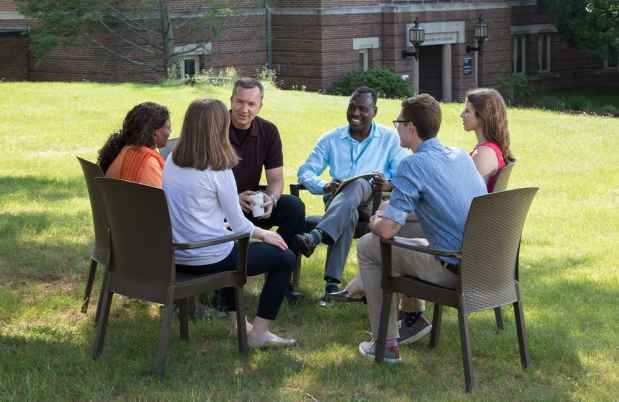In some urban areas, the incidence of post-traumatic stress disorder (PTSD) among young people rivals that of the military. Add to this the fact that a sizable percentage of people incarcerated in American prisons have untreated mental illness. With this in mind, McLean is bringing its expertise in cognitive behavior therapy (CBT)—a gold standard treatment for depression, anxiety, and trauma—to reduce violence risk factors in young people.
“To what extent can you apply a medical model to interrupt the cycles of trauma and violence in our cities?” asked Chief Scientific Officer Kerry J. Ressler, MD, PhD, who is also chief of McLean’s Division of Depression and Anxiety Disorders. “Most historical approaches to stopping violence have not taken mental health into account, yet we know the burden of trauma, mental illness, and substance use disorder is huge.”
That’s where a new collaboration between McLean and Roca comes in—a partnership generously supported by the Bank of America Charitable Foundation. Roca, a 30-year-old nonprofit, helps young adults ages 17 to 24 leave the streets, find work, and, for some, develop better parenting skills. Since 2014, Roca has been teaching clients CBT as a survival tool. CBT is an evidence-based treatment that helps people reframe their thinking and react to challenging situations in more constructive ways. Teaming up with McLean will enable Roca, which works in several Massachusetts cities as well as Baltimore, Maryland, to study the effectiveness of its CBT work, refine and deepen it, and share their expertise with other organizations.
CBT as Game Changer
Roca Chief Programming Officer Anisha Chablani-Medley feels that equipping young people, especially those who have suffered deep and repeated trauma, with CBT skills has been a game-changer for their program. She cited the example of a client getting angry at his work crew supervisor, swearing, walking off the job, and getting suspended. “The Roca youth worker reviewed what happened, what the client was thinking and feeling, and then what skill could have been used that might have helped him handle the situation differently,” explained Chablani-Medley. “The goal is to disrupt destructive patterns of thinking and behavior in real-time.”

McLean has recruited Alisha Moreland-Capuia, MD, a renowned psychiatrist working at the intersection of neuroscience, criminology, and public health advocacy, to lead the McLean-Roca collaboration as director of the new Program for Culturally and Trauma-Informed Community Outreach within the hospital’s Division of Depression and Anxiety Disorders. Dr. Moreland sees this role as an extension of the work she has been doing throughout her career: using trauma-informed approaches to transform systems. “We also have to reimagine how we work with young people—both in prevention and intervention—and one way to do this is to improve our understanding of human behavior, brain development, historical trauma, and healing,” she said.
Quantifying CBT’s Impact and Improving Its Use
According to Ressler, one very promising area the McLean-Roca partnership plans to explore is introducing wearable technologies and phone apps to the nonprofit’s CBT work. “The wearables would measure clients’ heart rates and breathing—the arousal response—and if those were heightened, that could trigger self-soothing tips to pop up on a cell phone or perhaps a survey with questions about mood, what happened, and the person’s beliefs about the event,” he explained. The survey responses and physiological data might prompt a phone call or text from a youth worker to keep the simmering situation from boiling over. “Collecting data in real time allows us to better understand what situations are getting people in trouble, how they’re using the CBT skills they have been taught, and, ultimately, how we can better target interventions,” said Ressler.
Bank of America Charitable Foundation President Kerry Sullivan said the Foundation is delighted to be supporting such transformational work. “McLean is one of the country’s top psychiatric hospitals and Roca has a three-decade track record of turning around the lives of some of our most hard-to-reach young people,” she said. “This collaboration promises to deepen Roca’s local work, but also to spread its impact, through training and advocacy, across the country.”
Together, McLean, Roca, and the Bank of America Charitable Foundation hope that their collective commitment and expertise will prove effective in the effort to lessen the stress and heal the trauma often experienced by young adults living in urban communities.
Media Requests
Journalist or member of the media? We are available 24/7 for media requests.



